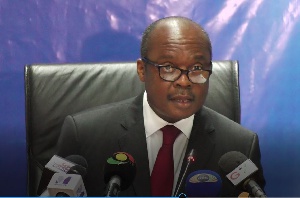 Dr. Ernest Addison, Governor of the Central Bank
Dr. Ernest Addison, Governor of the Central Bank
Pressure group OccupyGhana has urged the Bank of Ghana to go beyond just issuing public warnings against financial institutions that do illegal deposit-taking by stopping them completely.
In a statement released on Monday, 12 November, OG said it has seen a notice published by the Bank of Ghana in the newspapers on 8 November 2018, listing certain companies as not having been licensed to engage in the business of deposit-taking and warning the public not to deal with them.
“We would want to believe that before the bank issues any such notice, it would have ascertained that the companies listed are in fact, in deed, and obviously engaged in illegal deposit-taking; and it is on this premise that we are compelled to write this letter.
“This is not the first time that we are seeing a notice from the bank that some companies not licensed to conduct deposit-taking are doing just that. However, the notices have been roundly ignored and have failed to have any effect because it does not appear to us that the full effect and brunt of the law has ever been brought to bear on such companies and their controllers, directors, officers and shareholders.
“Effectively, the easiest sphere to commit a crime in Ghana, appears to be the financial sector because no one ever gets prosecuted for committing such crimes. It is a sad story, for instance, that after several years of persons unleashing one Ponzi scheme after another upon Ghana with devastating consequences for citizens and the economy, there does not appear to be a single successful prosecution of any controller, director, shareholder or officer of the companies that operated such schemes.
“The bank needs no reminder that by the Banks and Specialised Deposit-Taking Institutions Act, 2016 (Act 930) (and all preceding Banking legislation) Ghanaians have entrusted the bank with the ‘protection of depositors in the country through the regulation and supervision of financial institutions’”, the statement said.
OccupyGhana® said it is, therefore, concerned that where certain businesses are engaged in illegal deposit-taking, the central bank does not appear to have exercised its vast powers under sections 20 to 22 of Act 930 at all, except issuing notices and warning statements.
“Ghanaians have the right to demand that the bank takes the steps set out by law and apply the sanctions provided for breaches”, the statement said.
OccupyGhana®, the statement said, “Does not need to remind the Bank of Ghana that Act 930 gives it immense powers with respect to deposit-taking and prohibits anyone from accepting deposits from the general public or carrying on a deposit-taking business without the Bank’s licence.
“OccupyGhana® does not have to remind the bank that where it ‘has sufficient reason to believe that a person is transacting or carrying on a deposit-taking business or taking deposits in contravention’ of the law, the Bank has the power to cause a full-scale forensic audit to be conducted of that business to first ascertain that that person is involved in the illegal activity, and then ‘close down the business of [that] person’.
“The bank does not need any further reminder it that it is for good reason that the law empowers it, as part of this forensic audit, to demand the production of all books, instruct the freezing of assets, suspend the business, etc.
“The bank must be aware of its power to ensure the refund of all monies obtained and profits accrued, the return of all assets acquired as a result of the illegal activity, and the payment of interest that may be owing to people. The law adds that a person who fails to do these is deemed to be bankrupt and that the Bank may apply to court for the winding up and sequestration of the estate of that entity and its human agents, actors and controllers.
“Who needs to remind the Bank of Ghana that the above civil sanctions do not affect the person’s criminal liability for unauthorised deposit-taking, which includes fines and/or imprisonment between 2 and 4 years?
“If the Bank of Ghana does not require any of the above reminders of the vast powers given to it by the people of Ghana to prevent (and protect us from) unauthorised deposit-taking, then it beggars belief that the Bank has limited and restricted itself to merely issuing notices.
“OccupyGhana® is aware of the fact that the Bank has no direct power to prosecute offenders. That is why we expect that the Economic and Organised Crime Office (EOCO), would seamlessly take up the criminal investigation and prosecution of such matters. We regret that we are not seeing any such prosecutions.
“We, however, think that it is to address such situations of official inaction that Act 930 empowers the Bank to seek and obtain from the Attorney-General, an Executive Instrument (EI) authorising officers of your bank to prosecute such offences. OccupyGhana® hereby demands that you write to the Attorney-General for this EI, so that if EOCO is unprepared, unwillingly or unable to prosecute offenders, you may do so yourself.
“In conclusion, OccupyGhana® is demanding of the bank that you exercise your statutory powers in these matters in order that the law might take its normal course if it has to. It is our expectation as citizens that the Bank will take the appropriate steps and promptly”, the statement added.